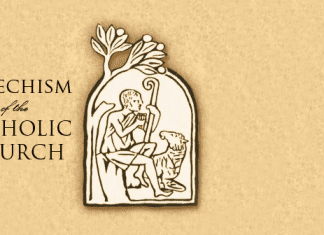Catechism of The Catholic Church #517
517 Christ's whole life is a mystery of redemption. Redemption comes to us above all through the blood of his cross, but this mystery is at work throughout Christ's entire life: -already in his Incarnation through which by becoming poor he enriches us with his poverty; - in his hidden life which by his submission atones for our disobedience; - in his word which purifies its hearers; - in his healings and exorcisms by which "he took our infirmities and bore our diseases"; - and in his Resurrection by which he justifies us.
Catechism of The Catholic Church #2206
2206 The relationships within the family bring an affinity of feelings, affections and interests, arising above all from the members' respect for one another. the family is a privileged community called to achieve a "sharing of thought and common deliberation by the spouses as well as their eager cooperation as parents in the children's upbringing."
Catechism of The Catholic Church #2811
2811 In spite of the holy Law that again and again their Holy God gives them - "You shall be holy, for I the LORD your God am holy" - and although the Lord shows patience for the sake of his name, the people turn away from the Holy One of Israel and profane his name among the nations. For this reason the just ones of the old covenant, the poor survivors returned from exile, and the prophets burned with passion for the name.
Catechism of The Catholic Church #2660
2660 Prayer in the events of each day and each moment is one of the secrets of the kingdom revealed to "little children," to the servants of Christ, to the poor of the Beatitudes. It is right and good to pray so that the coming of the kingdom of justice and peace may influence the march of history, but it is just as important to bring the help of prayer into humble, everyday situations; all forms of prayer can be the leaven to which the Lord compares the kingdom.
Catechism of The Catholic Church #701
701 The dove. At the end of the flood, whose symbolism refers to Baptism, a dove released by Noah returns with a fresh olive-tree branch in its beak as a sign that the earth was again habitable. When Christ comes up from the water of his baptism, the Holy Spirit, in the form of a dove, comes down upon him and remains with him. The Spirit comes down and remains in the purified hearts of the baptized. In certain churches, the Eucharist is reserved in a metal receptacle in the form of a dove (columbarium) suspended above the altar. Christian iconography traditionally uses a dove to suggest the Spirit.
Catechism of The Catholic Church #240
240 Jesus revealed that God is Father in an unheard-of sense: he is Father not only in being Creator; he is eternally Father by his relationship to his only Son who, reciprocally, is Son only in relation to his Father: "No one knows the Son except the Father, and no one knows the Father except the Son and any one to whom the Son chooses to reveal him."
Catechism of The Catholic Church #1649
1649 Yet there are some situations in which living together becomes practically impossible for a variety of reasons. In such cases the Church permits the physical separation of the couple and their living apart. the spouses do not cease to be husband and wife before God and so are not free to contract a new union. In this difficult situation, the best solution would be, if possible, reconciliation. The Christian community is called to help these persons live out their situation in a Christian manner and in fidelity to their marriage bond which remains indissoluble.
Catechism of The Catholic Church #29
29 But this "intimate and vital bond of man to God" can be forgotten, overlooked, or even explicitly rejected by man. Such attitudes can have different causes: revolt against evil in the world; religious ignorance or indifference; the cares and riches of this world; the scandal of bad example on the part of believers; currents of thought hostile to religion; finally, that attitude of sinful man which makes him hide from God out of fear and flee his call.
Catechism of The Catholic Church #1536
1536 Holy Orders is the sacrament through which the mission entrusted by Christ to his apostles continues to be exercised in the Church until the end of time: thus it is the sacrament of apostolic ministry. It includes three degrees: episcopate, presbyterate, and diaconate.
Catechism of The Catholic Church #1175
1175 The Liturgy of the Hours is intended to become the prayer of the whole People of God. In it Christ himself "continues his priestly work through his Church." His members participate according to their own place in the Church and the circumstances of their lives: priests devoted to the pastoral ministry, because they are called to remain diligent in prayer and the service of the word; religious, by the charism of their consecrated lives; all the faithful as much as possible: "Pastors of souls should see to it that the principal hours, especially Vespers, are celebrated in common in church on Sundays and on the more solemn feasts. the laity, too, are encouraged to recite the divine office, either with the priests, or among themselves, or even individually."














